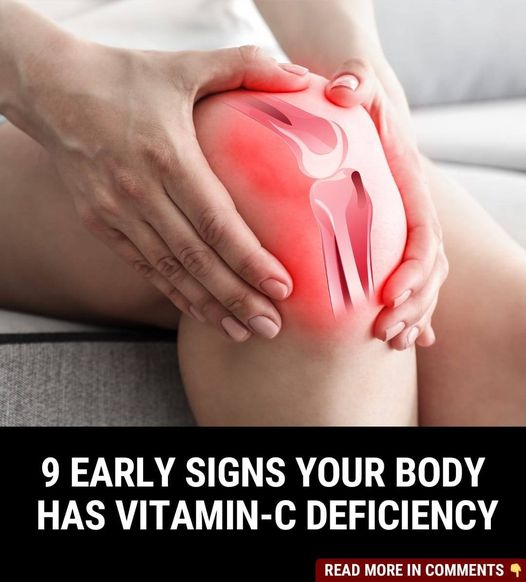ADVERTISEMENT
Early Warning Signs Your Body Needs Vitamin-C

3. Slowly Healing Wounds
When our body has insufficient vitamin C, the rate of collagen formation slows down, leading to a delay in the healing process of wounds (Galimberti & Mesinkovska, 2016). Recent research suggests that people who suffer from chronic, non-healing injuries are more likely to be vitamin C deficient. In some acute cases of vitamin C deficiency, old wounds may reopen, increasing the risk of infection (Lazareth et al., 2007). Slow wound healing or reopening old wounds is an advanced sign of deficiency that can heighten the risk of infection (Fain, 2005a). Therefore, maintaining adequate levels of vitamin C in our body promotes faster wound healing and reduces the risk of infection (Hirschmann & Raugi, 1999a).
4. Bleeding and Swollen Gums
When the body lacks sufficient vitamin C, the gum tissue may become weak and inflamed, and the blood vessels may start bleeding more easily. This can lead to the gums appearing red, swollen, and bleeding (Olmedo et al., 2006). Moreover, the gums may even take on a purplish hue in severe cases of vitamin C deficiency. Unhealthy gums can also affect the integrity of teeth over a prolonged timeframe (Larralde et al., 2007) (Fain, 2005a). Therefore, ensuring adequate vitamin C intake through a balanced and nutritious diet is crucial.
5. Painful Swollen Joints
Did you know that your joints contain a lot of collagen-rich connective tissue, which can also be affected by vitamin C deficiency? You must get enough vitamin C to keep your joints healthy and functioning correctly (Tamura et al., 2000).
6. Poor Immunity
Vitamin C is essential for obtaining a healthy immune system, which may increase the risk of severe infections like pneumonia (Johnston et al., 2014). Scientific studies suggest that vitamin C accumulates inside different types of immune cells, enhancing their function and aiding them in fighting diseases and destroying harmful pathogens (Carr & Maggini, 2017).
It is worth noting that people with scurvy, a condition caused by vitamin C deficiency, often suffer from a weakened immune system. If not treated promptly, this can result in a higher susceptibility to infections and, worse, fatalities (Pimentel, 2003a). An adequate amount of vitamin C in your diet is recommended to maintain a healthy immune system.
7. Iron Deficiency Anemia
There is a notable link between vitamin C and iron deficiency anemia. Low levels of vitamin C can contribute to iron deficiency anemia by reducing iron absorption from plant-based foods and negatively affecting iron metabolism (Teucher et al., 2004) (Lane & Richardson, 2014). Additionally, vitamin C deficiency increases the risk of excessive bleeding, which can lead to anemia (Agarwal et al., 2015).
If you are experiencing iron deficiency anemia without any apparent causes, it is recommended to check your vitamin C levels.
8. Fatigue
When your body doesn’t receive enough vitamin C, it can lead to various health problems. Fatigue and a glum mood are some of the earliest signs of vitamin C deficiency (Maggini et al., 2010). These symptoms may appear before the deficiency reaches its full-blown state (Levine et al., 1996). Though fatigue and irritability are some of the first symptoms, they can often be resolved by increasing your daily vitamin C intake (Levine et al., 1996).
9. Oxidative Stress leading to Chronic Inflammation
Vitamin C is one of the most critical antioxidants, fighting cellular damage caused by free radicals. Low vitamin C intake has been shown to increase the risk of heart disease, oxidative stress, and inflammation (Helmersson et al., 2008) (Moser & Chun, 2016). A study found that people with low blood levels of vitamin C were 40% more prone to progress into heart failure within 15 years than those with high blood levels (Pfister et al., 2011).
Which foods are highest in vitamin C?
Vitamin C is essential for our body’s growth, development, and repair. Men’s recommended dietary intake (RDI) of vitamin C is 90 milligrams daily, while women require 75 milligrams daily (Jacob & Sotoudeh, 2002b). However, it’s important to note that certain factors, such as smoking, pregnancy, and illness, can increase the demand for vitamin C in the body (Jen & Yan, 2010) (Gariballa & Forster, 2009). Fortunately, plenty of delicious foods are rich in vitamin C. Some of the best sources of vitamin C include:
Oranges
Grapefruits
Lemons
Kiwi
Strawberries
Papaya
Bell peppers
Broccoli
Tomatoes.
Acerola cherry
Guava
Blackcurrants
Sweet red pepper, and
Parsley
Continued on next page
ADVERTISEMENT